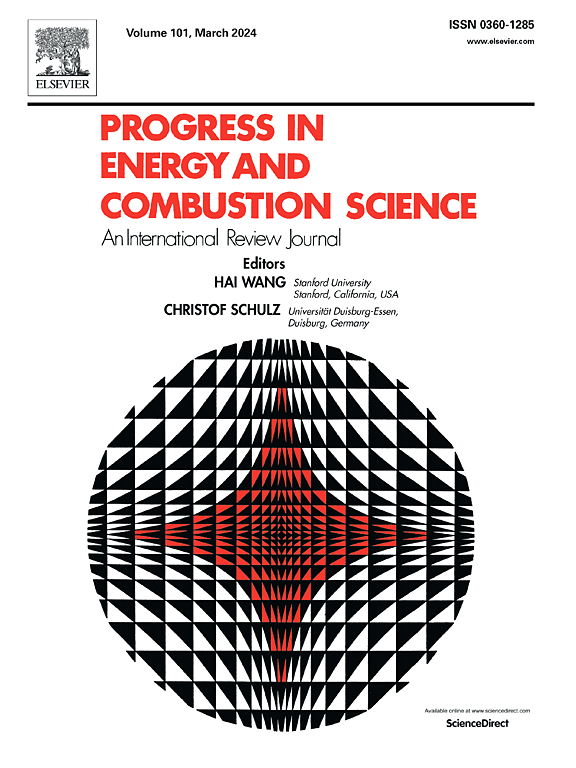Future of internal combustion engines using sustainable, scalable, and storable E-fuels and biofuels for decarbonizing transport and enabling advanced combustion technologies
IF 37
1区 工程技术
Q1 ENERGY & FUELS
引用次数: 0
Abstract
Internal combustion (IC) engines have contributed to global economic development in industrialized societies. Hydrocarbon fuels used for fueling the IC engines need to be replaced by sustainable and eco-friendly origins that do not adversely impact the environment locally and globally. Electro-fuels (or E-fuels) and biofuels are essential to displace fossil fuels. They are primarily produced using renewable electricity and feedstocks, respectively, and represent an emerging class of carbon-neutral drop-in fuels for the transport sector, which are becoming increasingly important with every passing day globally and have an essential role in the ‘net-zero’ future. This paper comprehensively reviews the advancements in IC engines to become more efficient in taking the fuel property advantages of various E-fuels and biofuels in existing engines. The paper focuses on several fuels, among the most studied ones in the open literature in the last decade, since their adoption might depend on factors such as the local economic considerations, cultural contexts and the application itself, storability, power requirement, and government policies. The paper covers these fuels by briefly introducing their production pathways and properties. It then focuses on their engine use to meet the future tailpipe and greenhouse gas emissions norms. Challenges regarding the modelling of engines powered by E- or bio-fuels are also included. E-fuels offer a straightforward advantage even in engine-out emissions and after-exhaust emission control technologies. It represents an opportunity to limit GHG emissions. Moreover, the E−(or Bio-) fuels powered engines can cover the same operating range (or a larger one) with similar efficiency or greater than hydrocarbon fuels. However, using these fuels still remain challenging. Retrofitting existing engines for using E−(or Bio-) fuels depends on the cost of the fuel injection system for injecting the fuel into the combustion chamber. The transition from fossil fuels can be done using liquid fuels such as methanol, ethanol, etc., by blending them with conventional fuels. In the long run, methanol, hydrogen, and ammonia are expected to significantly decarbonize the transport sector globally.
使用可持续、可扩展、可储存的电动燃料和生物燃料的内燃机的未来,用于脱碳运输和实现先进的燃烧技术
内燃机为工业化社会的全球经济发展做出了贡献。为内燃机提供燃料的碳氢化合物燃料需要被可持续的、环保的、不会对当地和全球环境产生不利影响的燃料所取代。电燃料(或E-fuels)和生物燃料对于取代化石燃料至关重要。它们主要分别使用可再生电力和原料生产,代表了运输部门一种新兴的碳中性燃料,在全球范围内日益重要,在“净零”未来中发挥着至关重要的作用。本文全面回顾了内燃机的发展,以更有效地利用现有发动机中各种电子燃料和生物燃料的燃料性能优势。这篇论文的重点是几种燃料,这是过去十年中公开文献中研究最多的几种燃料,因为它们的采用可能取决于当地经济考虑、文化背景和应用本身、可储存性、电力需求和政府政策等因素。本文简要介绍了这些燃料的生产途径和性质。然后,它将重点放在发动机的使用上,以满足未来的排气管和温室气体排放标准。关于由电子或生物燃料驱动的发动机建模的挑战也包括在内。即使在发动机排放和后废气排放控制技术方面,电子燃料也提供了直接的优势。它代表了一个限制温室气体排放的机会。此外,以E -(或Bio-)燃料为动力的发动机可以覆盖相同(或更大)的工作范围,效率与碳氢化合物燃料相似或更高。然而,使用这些燃料仍然具有挑战性。改造现有发动机以使用E -(或Bio-)燃料取决于将燃料注入燃烧室的燃油喷射系统的成本。从化石燃料的过渡可以使用液体燃料,如甲醇、乙醇等,通过将它们与传统燃料混合来完成。从长远来看,甲醇、氢和氨有望显著降低全球运输部门的碳排放。
本文章由计算机程序翻译,如有差异,请以英文原文为准。
求助全文
约1分钟内获得全文
求助全文
来源期刊

Progress in Energy and Combustion Science
工程技术-工程:化工
CiteScore
59.30
自引率
0.70%
发文量
44
审稿时长
3 months
期刊介绍:
Progress in Energy and Combustion Science (PECS) publishes review articles covering all aspects of energy and combustion science. These articles offer a comprehensive, in-depth overview, evaluation, and discussion of specific topics. Given the importance of climate change and energy conservation, efficient combustion of fossil fuels and the development of sustainable energy systems are emphasized. Environmental protection requires limiting pollutants, including greenhouse gases, emitted from combustion and other energy-intensive systems. Additionally, combustion plays a vital role in process technology and materials science.
PECS features articles authored by internationally recognized experts in combustion, flames, fuel science and technology, and sustainable energy solutions. Each volume includes specially commissioned review articles providing orderly and concise surveys and scientific discussions on various aspects of combustion and energy. While not overly lengthy, these articles allow authors to thoroughly and comprehensively explore their subjects. They serve as valuable resources for researchers seeking knowledge beyond their own fields and for students and engineers in government and industrial research seeking comprehensive reviews and practical solutions.
 求助内容:
求助内容: 应助结果提醒方式:
应助结果提醒方式:


